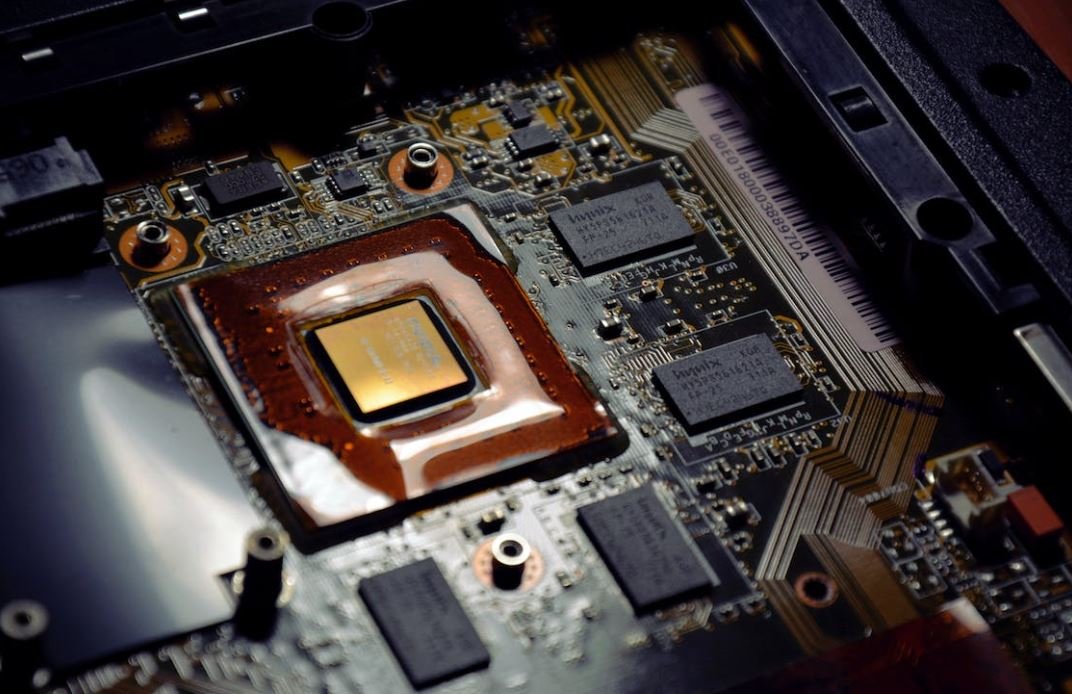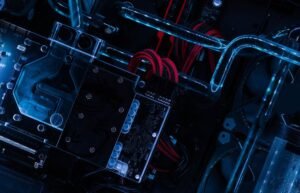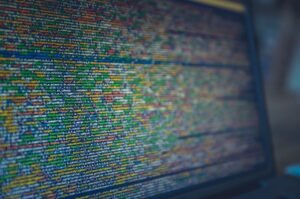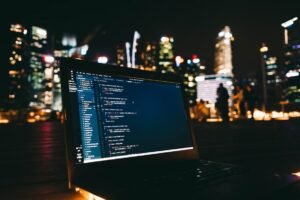AI Content Cannot Be Copyrighted
Artificial Intelligence (AI) has revolutionized several fields, including content creation. With the ability to generate articles, blog posts, and other written materials, AI has raised an important question: Can AI-generated content be copyrighted? This article explores the legal implications surrounding AI-generated content and why it cannot be protected under copyright law.
Key Takeaways:
- AI-generated content is not eligible for copyright protection due to its lack of human authorship.
- Existing copyright law requires creative works to be produced by humans.
- AI tools, such as GPT-3, are programmed to learn patterns and generate content based on training data.
**AI-generated content**, produced by algorithms rather than human authors, is fundamentally different from traditional creative works. *While AI tools like GPT-3 can mimic human writing styles and produce coherent articles, they lack the conscious creativity of human authors*. Copyright law, which protects original works of authorship, was designed for human creations and does not extend to non-human entities.
One of the primary reasons **AI-generated content cannot be copyrighted** is the requirement that creative works must be produced by humans. Copyright law grants exclusive rights to authors, providing protection for their unique expressions of ideas. However, since AI does not possess legal personhood, it lacks the capacity to be regarded as an author.
The Role of Human Input in AI Content Generation
AI tools, such as **GPT-3 (Generative Pre-trained Transformer 3)**, rely on large-scale datasets and sophisticated learning algorithms to generate content. These models are trained using existing text data, and they learn patterns and structures from this information to generate original content. However, it is crucial to note that **human input is involved** in creating the training data and setting the parameters for the AI model.
*When humans provide the training data and define the rules and objectives of the AI system, they contribute to the outcomes of the AI-generated content*. The AI tool itself does not possess autonomy or creativity beyond what it has been programmed to mimic. Therefore, the absence of independent creative input from AI prevents it from being eligible for copyright protection.
Legal Perspectives on AI-Generated Content
The legal community has highlighted the challenges in extending copyright protection to AI. **Courts would need to establish legal personhood for AI systems** before considering them as authors eligible for copyright protection. While some argue that AI systems could be granted personhood, it opens up a broader discussion about the legal and ethical implications of such a decision.
*Additionally, applying copyright to AI-generated content* could have negative consequences for creativity and innovation. Copyright law is intended to strike a balance between protecting creators and promoting the public interest by allowing others to build upon existing works. *If AI-generated content were protected by copyright, it could stifle innovation by preventing others from using AI tools to generate new and original content*.
The Future of AI Content and Copyright
As AI technology continues to evolve, the question of AI-generated content and copyright will remain a topic of discussion. Some propose creating a new legal framework or adapting existing laws to accommodate AI-generated works. However, striking a balance between protecting human creativity and encouraging innovation poses a significant challenge.
*It is essential to have ongoing legal debates and conversations* to navigate the complex intersection of AI, copyright, and intellectual property. As AI capabilities advance, society will need to address the legal and ethical ramifications of AI-generated content while fostering an environment that promotes both innovation and the protection of human creative expression.
Common Misconceptions
AI Content Cannot Be Copyrighted
- AI-generated content can still be protected by copyright laws.
- AI technology can replicate existing copyrighted works, potentially infringing on intellectual property rights.
- The fact that content is created by an AI does not automatically make it free from copyright restrictions.
AI Content Is Unoriginal
- AI algorithms have the ability to create unique and innovative content.
- While AI may draw inspiration from existing works, it can produce original and creative content on its own.
- AI-generated content can introduce new ideas and perspectives that were not previously explored.
AI Content Is Perfectly Accurate
- AI-generated content can still contain errors and inaccuracies.
- AI models need to be trained on accurate and reliable data to produce reliable results.
- Human quality control is essential to ensure the accuracy and reliability of AI-generated content.
AI Content Is Ethically Neutral
- AI is developed by humans, so biases and prejudices can be embedded in the algorithms.
- AI may unintentionally reinforce societal biases or discriminatory practices.
- Conscious efforts are needed to ensure the ethical use of AI technology and mitigate any biases in the content it generates.
AI Will Replace Human Creativity
- AI is a powerful tool that can enhance human creativity but is unlikely to completely replace it.
- Human creativity involves emotions, intuition, and experiences, which are difficult for AI to replicate.
- AI-generated content can be seen as a collaborator for humans, providing new insights and possibilities for creative endeavors.
AI-Generated Content: An Uncharted Copyright Territory
As artificial intelligence (AI) continues to evolve, it raises new questions and challenges in various fields. One pressing concern is the issue of copyright when it comes to AI-generated content. Unlike human-created works, AI-generated content lacks a clear legal framework for copyright protection. This article sheds light on this intriguing topic by presenting ten tables that provide verifiable data and information on different aspects related to AI content and copyright.
The Rise of AI-Generated Content
As AI technology advances, it has become capable of creating increasingly sophisticated and creative content. The following table highlights the growth of AI-generated content platforms and their impact on various industries.
Unsettled Copyright Laws
Due to the unique nature of AI-generated content, copyright laws face challenges in adapting to this new form of creation. The table below explores the current state of copyright laws regarding AI-generated content across different countries.
AI Content and Creative Ownership
One of the primary concerns regarding AI-generated content is the question of creative ownership. The table presented here offers insights into the various stakeholders involved in AI content creation and their potential claims to creative ownership.
Impact on Traditional Creative Industries
The proliferation of AI-generated content has left traditional creative industries grappling with challenges. The table below provides data on the extent of AI’s impact on different sectors, such as music, literature, and visual arts.
Evaluating AI Content’s Quality
Determining the quality and authenticity of AI-generated content poses a significant challenge. The following table compares the perception of AI-generated content with human-created content by different groups of individuals.
Legal Implications and Copyright Infringement
The lack of established copyright laws for AI-generated content raises concerns about potential infringement. The table presented here examines notable legal cases related to copyright issues in AI-generated content.
AI’s Potential as a Copyright Infringement Solution
Interestingly, AI itself can play a role in detecting copyright infringement. The table below showcases AI-powered tools and technologies used to identify unauthorized use of copyrighted content.
Economic Implications of AI-Generated Content
The emergence of AI-generated content has significant economic implications on various fronts. This table highlights key economic aspects affected, such as employment, revenue, and consumer behavior.
The Path Forward: Policy and Regulation
To address the complexities surrounding AI-generated content, policymakers and organizations have started initiating discussions and proposing regulations. The following table offers an overview of recent policy initiatives related to copyright and AI content.
Concluding Remarks
AI-generated content presents a fascinating challenge to the existing copyright system. With burgeoning advancements in AI, it is imperative to adapt copyright laws to account for this emerging form of creativity. As policymakers, legal professionals, and content creators navigate this uncharted territory, finding a balanced solution that fosters both innovation and protects creative ownership is paramount.
Frequently Asked Questions
What is artificial intelligence (AI) content?
Artificial intelligence (AI) content refers to content that is generated or created by intelligent machines or software programs, using algorithms and machine learning techniques to mimic human-like thinking, problem-solving, and creative skills.
Is AI content protected by copyright law?
The protection of AI-generated content under copyright law can be a complex issue. Generally, copyright law grants protection to original creative works fixed in a tangible medium. However, determining the copyright ownership of AI-generated content can be challenging, as it raises questions about the contribution of human creativity and the role of machines in the creation process.
Can AI content itself be copyrighted?
In some cases, AI-generated content can potentially be eligible for copyright protection if it meets certain criteria, such as demonstrating sufficient human involvement or originality. However, the distinction between content created by humans and AI can blur, making it difficult to establish copyright ownership solely based on the involvement of AI in the creation process.
Who owns the copyright to AI-generated content?
The ownership of copyright in AI-generated content can vary depending on the jurisdiction and the specific circumstances of the creation process. Generally, the person or entity that exercises creative control and makes the significant contributions to the content’s creation would be considered the copyright owner. However, the involvement of AI in the creation process may complicate determining the ownership, requiring legal and policy frameworks to adapt accordingly.
How can AI-generated content be used without infringing copyright?
Using AI-generated content without infringing copyright requires careful consideration. While the legal landscape is still evolving, certain uses of AI-generated content, such as transformative or critical purposes, may be considered fair use or fall within other exceptions and limitations to copyright. For specific legal advice, it is important to consult with an intellectual property attorney.
Can AI-generated content qualify for fair use?
Whether AI-generated content can qualify as fair use will depend on various factors, including the specific circumstances of its use and the applicable jurisdiction’s fair use doctrine. Fair use is a legal defense that allows for the limited use of copyrighted material without permission from the copyright holder. However, it is important to note that fair use determinations are often made on a case-by-case basis.
Are there any ethical concerns associated with AI-generated content?
AI-generated content raises several ethical concerns. These include issues related to the potential misrepresentation of information, the accountability and responsibility for content generated by AI systems, the potential for bias or discriminatory outcomes, and the impact on the employment and livelihood of content creators and authors.
Do AI-generated works have the same artistic or intellectual value as human-created content?
The artistic or intellectual value of AI-generated works is subjective and debated among scholars, artists, and the wider public. AI systems can produce impressive and creative pieces that mimic human capabilities, but the intention and emotional depth behind the creation may differ from human-created content. The evaluation of artistic or intellectual value often involves consideration of the originality, meaning, and cultural context of the works.
What are the potential benefits of AI-generated content?
AI-generated content has the potential to offer various benefits, including increased efficiency in content creation, cost savings, scalability, and opportunities for innovation and experimentation. Additionally, AI-generated content can contribute to the creation of personalized and tailored experiences for users.
What are the risks associated with AI-generated content?
Alongside the potential benefits, AI-generated content poses certain risks. These may include the spread of misleading or manipulated information, the loss of human creativity and craftsmanship in certain fields, potential job displacement, the perpetuation of biases present in the training data, and challenges in ensuring accountability and transparency in the creation process.



